Aeolus (Odyssey)
In Greek mythology, Aeolus[1] (/iːˈoʊləs/; Ancient Greek: Αἴολος, Aiolos [a͜ɪ́olos], Modern Greek: Αίολος [ˈe.o.los] (![]()
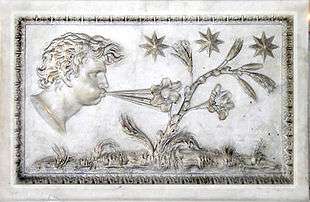
Family
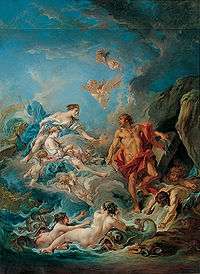
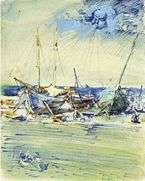
Aeolus was the son of Hippotes, son of Mimas, a son of Aeolus, son of Hellen. He was most frequently conflated with Aeolus, the son of Poseidon, god of the sea. According to some accounts, Hippotes married the same Melanippe who was the mother of Arne.[2]
Like Aeolus, the son of Poseidon, this Aeolus was said to have had twelve children - six sons and six daughters. According to Diodorus, he was father of six sons by Cyane, daughter of Liparus (the eponym of the island Lipara, whom Aeolus assisted in conquering lands above Surrentum, Italy). The sons' names were Agathyrnus, Astyochus, Androcles, Iocastus, Pheraemon, Xuthus, whereas the daughters are not mentioned at all. The sons were said to have become kings: Iocastus of the region in southern Italy as far as Rhegium; Pheraemon and Androcles of the part of Sicily between the Strait of Messina and Lilybaeum; Xuthus of Leontini; Agathyrnus of what was known as Agathyrnitis, having founded Agathyrnum; and Astyochus of Lipara. All were said to have been remembered as just and pious rulers.[3]
Another list of Aeolus' children is found in scholia on the Odyssey. The latter source gives the sons' names as Androcles, Chrysippus, Iocastus, Phalacrus, Pheraemon, Xuthus, and the daughters' as Aeole, Astycrateia, Dia, Hephaestia, Iphthe, Periboea; their mother in this account is Telepora or Telepatra, daughter of Laestrygon.[4]
Parthenius of Nicaea[5] recorded a love affair between Odysseus and Aeolus' daughter Polymele; the latter was said to have ended up betrothed to her own brother Diores.
Mythology
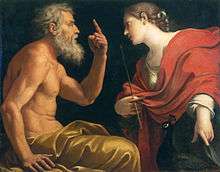
This Aeolus lived on the floating island of Aeolia and was visited by Odysseus and his crew in the Odyssey. After their misadventure in Polyphemus' cave, Aeolus gave them hospitality for a month and provided them a west wind to carry them home to Ithaca. He also provided a gift of an ox-hide bag containing all winds but the west. Odysseus and his crew members traveled steadily and anxiously for several days, but with his native land in sight, Odysseus sank overpowered by sleep. His men proceeded to indulge their curiosity to see the costly presents which they thought the bag contained, opened it unwittingly, and out burst the imprisoned winds with such a roar that the force drove the ship back to Aeolus' island. Aeolus refused to provide any further help,[6] because he believed that their short and unsuccessful voyage meant that the gods did not favour them. This Aeolus was perceived by post-Homeric authors as a god, rather than as a mortal and simple Keeper of the Winds (as in the Odyssey).
In the Aeneid by Virgil, Juno offers Aeolus the nymph Deiopea as a wife if he will release his winds upon the fleet of Aeneas,[7] but Poseidon later calms the sea.
Gallery
Aeolus and Odysseus
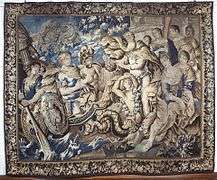 Aeolus
Aeolus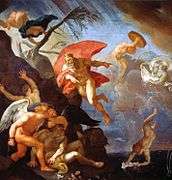 Allegory of Winter by Jerzy Siemiginowski-Eleuter (1683)
Allegory of Winter by Jerzy Siemiginowski-Eleuter (1683)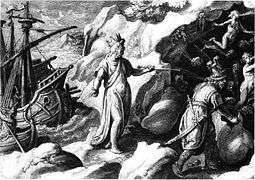 Odysseus in the Cave of the Winds by Stradanus (possibly 1590-1599)
Odysseus in the Cave of the Winds by Stradanus (possibly 1590-1599)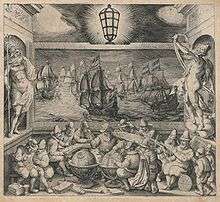 Book frontispiece of the sailing handbook "The light of navigation". (On the left side, Neptune, the god of water and the sea, on the right Aeolus, the ruler of the winds)
Book frontispiece of the sailing handbook "The light of navigation". (On the left side, Neptune, the god of water and the sea, on the right Aeolus, the ruler of the winds)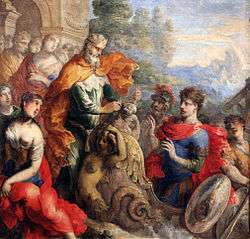 Aeolus Giving the Winds to Odysseus by Isaac Moillon
Aeolus Giving the Winds to Odysseus by Isaac Moillon
Aeolus and Juno
_(Aeneid_I)%2C_1718.jpg) Air (Juno orders Aeolus to release the winds) (Aeneid I) by Charles Dupuis (1718)
Air (Juno orders Aeolus to release the winds) (Aeneid I) by Charles Dupuis (1718)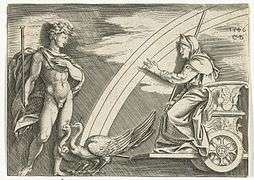 Juno en Aeolus by Cornelis Bos (1546)
Juno en Aeolus by Cornelis Bos (1546)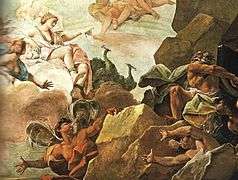 Giunone ordina a Eolo di liberare i Venti (particolare), affresco nel Palazzo Sanvitale di Parma. (circa 1790)
Giunone ordina a Eolo di liberare i Venti (particolare), affresco nel Palazzo Sanvitale di Parma. (circa 1790)%2C_1800.jpg) Air (Juno orders Aeolus to release the winds) by Manuel de Samaniego (circa 1800)
Air (Juno orders Aeolus to release the winds) by Manuel de Samaniego (circa 1800)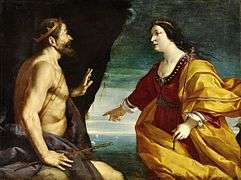 Juno and King Aeolus at the Cave of winds by Antonio Randa (Italy, 1577-1650)
Juno and King Aeolus at the Cave of winds by Antonio Randa (Italy, 1577-1650)
Notes
- Chaucer's Eolus (de Weever, Jacqueline (1996). Chaucer Name Dictionary, s.v. "Eolus". (Garland Publishing) Retrieved on 2009-10-06
- Diodorus Siculus, Bibliotheca historica 4.67.3 (trans. Oldfather)
- Diodorus Siculus, Bibliotheca historica 4.7.6 & 4.8.3
- Scholia on Homer, Odyssey 10.6
- Parthenius, Erotica Pathemata 2
- Homer, Odyssey 10.2
- Virgil, Aeneid 1.71-75
References
- Diodorus Siculus, The Library of History translated by Charles Henry Oldfather. Twelve volumes. Loeb Classical Library. Cambridge, Massachusetts: Harvard University Press; London: William Heinemann, Ltd. 1989. Vol. 3. Books 4.59–8. Online version at Bill Thayer's Web Site
- Diodorus Siculus, Bibliotheca Historica. Vol 1-2. Immanel Bekker. Ludwig Dindorf. Friedrich Vogel. in aedibus B. G. Teubneri. Leipzig. 1888-1890. Greek text available at the Perseus Digital Library.
- Homer, The Odyssey with an English Translation by A.T. Murray, PH.D. in two volumes. Cambridge, MA., Harvard University Press; London, William Heinemann, Ltd. 1919. Online version at the Perseus Digital Library. Greek text available from the same website.
- Parthenius, Love Romances translated by Sir Stephen Gaselee (1882-1943), S. Loeb Classical Library Volume 69. Cambridge, MA. Harvard University Press. 1916. Online version at the Topos Text Project.
- Parthenius, Erotici Scriptores Graeci, Vol. 1. Rudolf Hercher. in aedibus B. G. Teubneri. Leipzig. 1858. Greek text available at the Perseus Digital Library.
- Publius Vergilius Maro, Aeneid. Theodore C. Williams. trans. Boston. Houghton Mifflin Co. 1910. Online version at the Perseus Digital Library.
- Publius Vergilius Maro, Bucolics, Aeneid, and Georgics. J. B. Greenough. Boston. Ginn & Co. 1900. Latin text available at the Perseus Digital Library.